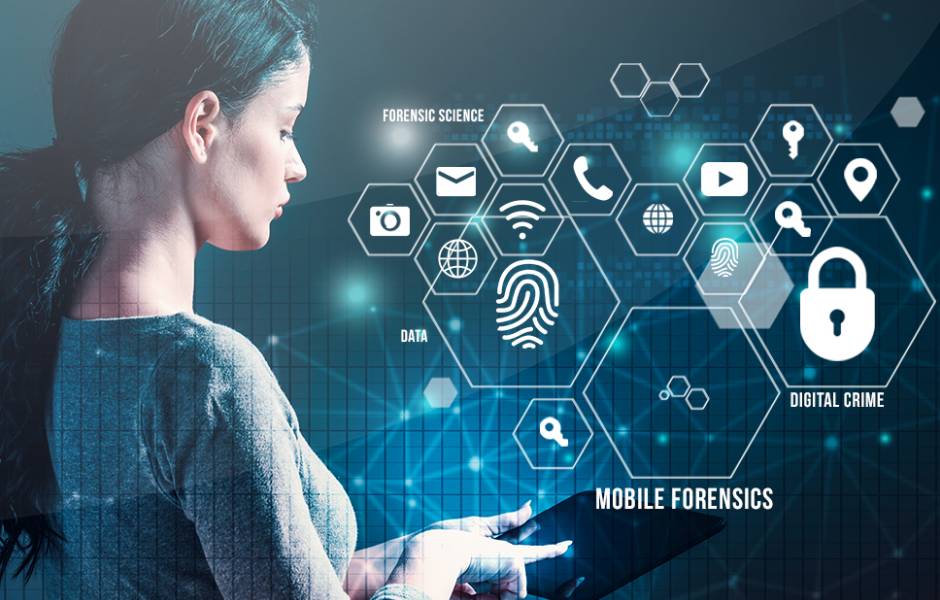In summary, digital forensic services involve collection, examination and analysis of digital evidence stored in mobile phones, computers, disks, cars, smart appliances and various electronic sources to uncover information related to cybercrimes, data breaches, IP theft, or other types of crime such as fraud, murder, child pornography, harassment, stalking and related felonies.

What types of data are collected and examined in digital forensic investigations?
Digital forensics covers a wide range of data sources, including computers, servers, mobile devices, network logs, and various digital storage media devices
- It can also involve collection of data by examining surveillance cameras, CCTV footage, media cards, USB memory cards, drones, cars, satellite navigation systems, email accounts, websites, digital documents, audio recordings, photos, dark web and social media.
- Additional sources can include smart appliances such as TVs, smart speakers, smart kitchens, smart homes or businesses, smart cameras and door entry keys.
- Collection and examination of data from online publicly available resources such as government websites, Companies House, Land Registry, Register of Marriages. Deaths and Divorces, newspaper articles, archive material, historical data, register of court orders and convictions and many other open-source intelligence resources otherwise known as OSINT or Open Source Intelligence.
How digital forensics can help civil or criminal investigations
In Civil Litigation:
- Digital forensic analysis can be used to support civil litigation by examining digital evidence in cases relating divorce, child custody, IP theft, business data exfiltration, digital document forgery, deep fakes, impersonation or ID theft.
- Other examples include disputes between individuals or organisations, addressing issues like breach of contracts, property disputes, personal injury involving digital documents such as bank statements, contracts, emails, web browsing history, internet search terms, WhatsApp messages etc.
In Criminal Prosecutions:
Digital evidence plays a crucial role in criminal proceedings, helping to establish facts, prove guilt or innocence, and support investigative findings. Here’s how it can be used:
Establishing a Timeline of Events
Digital timestamps on emails, text messages, and files can show when specific actions occurred. GPS data from mobile phones and vehicles can track a suspect’s movements.
Proving Intent and Motive
Social media posts, emails, and chat logs can reveal premeditation or motive. Internet search history can provide insight into a suspect’s mindset before a crime.
Linking a Suspect to a Crime Scene
Surveillance footage, doorbell cameras, and ATM recordings can place a suspect at a location. Call logs and mobile tower data can show proximity to a crime scene.
Authenticating Communications
Encrypted messages, emails, and social media chats can be decrypted and analysed. Voice recordings and phone call logs can confirm conversations between suspects.
Corroborating or Disputing Witness Testimonies
Digital records, such as hotel check-ins or online purchases, can confirm or contradict witness statements. Body cam footage from law enforcement can provide an unbiased account of interactions.
Identifying Financial Crimes
Transaction records, cryptocurrency wallets, and bank logs can trace illegal financial activities. Fraudulent transactions and money laundering trails can be identified using forensic accounting.
Detecting Cybercrimes
Hacking, identity theft, and online fraud can be traced using IP addresses and digital footprints. Digital forensic experts can recover deleted files, emails, and messages for evidence.
Cybercrime Investigation:
Digital forensics helps uncover evidence of cybercrimes, data breaches, hacking, impersonation, online fraud or unauthorised computer activities.
Forensic data recovery:
It can be used to recover data from formatted or damaged hard drives, mobile phones, memory cards/sticks or recover deliberately or unintentionally deleted or corrupted data.
Internal Corporate Investigations:
Digital forensics can be used to investigate internal security incidents, such as insider threats or intellectual property theft.
Incident Response:
Digital forensics experts can help organisations respond to security incidents, such as ransomware attacks or network intrusions.
Key Services Offered by Digital Forensic Professionals:
- Data Acquisition: Collecting data from various devices and sources in a forensically sound manner.
- Data Preservation: Ensuring that the integrity of the data is maintained during the investigation.
- Data Analysis: Examining the collected data to identify relevant information and evidence.
- Reporting: Preparing reports that present the findings of the investigation in a clear and concise manner.
- Expert Witness (aka Testimony): Providing expert testimony in court to support the findings of the investigation.
If you need digital forensic services as a law enforcement officer, prosecution, solicitor, company director or private individual, you can call our digital forensic experts directly on 02071646971 or use the SECURE SERVICE INQUIRY FORM.
This is article is authored by Joseph Naghdi, Senior Digital Forensic Analyst. Computer Forensics Lab, London, UK, Copyright 2025.